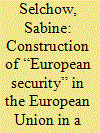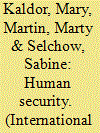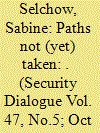|
|
|
Sort Order |
|
|
|
Items / Page
|
|
|
|
|
|
|
| Srl | Item |
| 1 |
ID:
146994


|
|
|
|
|
| Summary/Abstract |
In June 2015 High Representative Mogherini presented her strategic assessment The European Union in a changing global environment as the express point of reference for the new EU Global Strategy. Grounded in the premise that this assessment is not simply a description of the state of the world but plays into the construction of social reality, this article sets out to understand the openings and closings of possibilities that it holds. My analysis generates a number of concrete insights, ranging from insights into the distinct nature of the challenges the EU is facing, to the discovery that there is no “existential threat” and the importance of “regions” as a guiding category. Grounded in an understanding of the world as being reflexive modern, I interpret these findings as displaying an intriguing and paradoxical interpretive disposition. On the one side, there is a notable opening towards unconventional conceptions of the world; on the other side, there is a symbolic conservation of existing EU institutions and programmes and a reproduction of modern premises. I argue that it is the first aspect that makes the document significant: Mogherini’s strategic assessment opens an important discursive space to think (European) security anew.
|
|
|
|
|
|
|
|
|
|
|
|
|
|
|
|
| 2 |
ID:
076526


|
|
|
|
|
| Publication |
2007.
|
| Summary/Abstract |
This article examines the potential of human security as a narrative and operational frame for the European Union's external relations. Human security is about the security of individuals and communities and it links physical and material security-`freedom from fear', and `freedom from want'. The article addresses both the lexis (language) and praxis (practice)of human security in relation to the EU. Much of the language currently used in EU external relations, particularly crisis management, civil-military cooperation and conflict management, already contains elements of a human security approach. At the same time, the concept of human security goes beyond these terms and if formally adopted and elaborated could greatly strengthen the EU's role as a global security actor. The article develops five principles of human security-human rights, legitimate political authority, multilateralism and regional focus-and makes the case that the application of these principles would increase the coherence, effectiveness and visibility of EU missions. The article concludes that the adoption of a human security approach would build on the foundational ideas of Europe in overcominga history of war and imperialism and could help to rally public opinion behind the European idea. More importantly, it would contribute to closing the real security vacuum that exists in large parts of the world today.
|
|
|
|
|
|
|
|
|
|
|
|
|
|
|
|
| 3 |
ID:
148326


|
|
|
|
|
| Summary/Abstract |
While it is Ulrich Beck’s concept of ‘risk society’ that has mostly attracted attention in the field of security studies, in this article I argue that if we want to take Beck seriously, we need to go beyond his ‘risk society’ thesis and acknowledge that his main thesis was that we live in a social reality that is qualitatively new and, consequently, calls for a radical shift in how we look at and talk about it. To bring Beck into security studies, then, means to study ‘security’ from within Beck’s ‘new world’. For that, I argue, a sharper conception of what characterizes that world is needed. At the heart of my article I provide such a conception – the ‘cosmopolitized world’ – which I identify as being shaped by non-linearity and the interplay of two moments: the ‘cosmopolitized reality’ and the ‘tradition of the national perspective’. Building on this concept and experimenting with it, I turn to reading the ‘US national security’ discourse as this is constructed in the text of the 2015 National Security Strategy from within this ‘cosmopolitized world’. Reflecting on this experiment, I conclude by highlighting the potential that bringing Beck in this way into security studies holds, as well as pointing to the need for future work on the vocabulary of the ‘cosmopolitized world’.
|
|
|
|
|
|
|
|
|
|
|
|
|
|
|
|
|
|
|
|
|